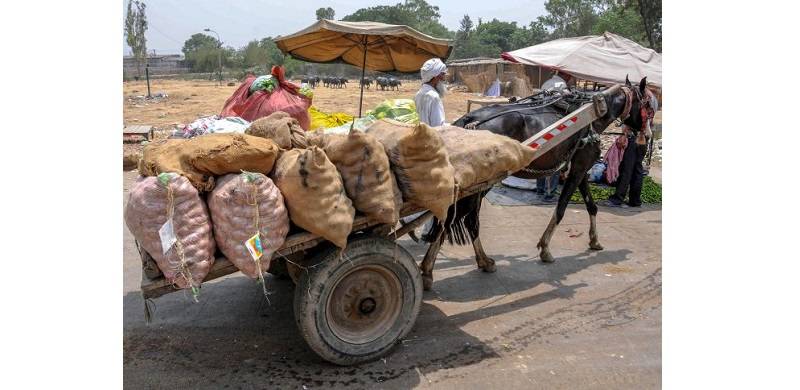
Apart from Indian farmers, the traders are also on the agitation path. The Confederation of All India Traders (CAIT) has called for a Bharat Bandh (All India closure) on the 26th of February. What is the reason for this agitation by Indian farmers and traders alike?
To understand this, one must know that there is a world economic recession going on. The big international and national corporates have huge amounts of money stacked up with them, and it is in the nature of capital that it seeks avenues for profitable investment. Presently, most of these avenues appear to be closed or considerably restricted. However, there is a huge avenue in the trading and agricultural sector of the Indian economy which had, till late, been left largely unexplored by the big corporates. It seems that now they have decided to enter it in a big way.
Just as big sharks eat up the small fish, so also big business eliminate the smaller ones. For example, online shopping which has been introduced in India by giant corporates like Amazon has caused great harm to Indian shopkeepers, since people now often do online shopping instead of going to shops. Often the corporates initially sell at prices below those in shops, but after the latter are eliminated, these prices will be raised again. There are millions of employees in these shops, and they may now all face unemployment if the shops close down.
The Indian government seems to have become totally subservient to the big international and national corporates: it is in their grip and obeying their diktats.
And the new farmers' laws made by the Indian Parliament at the behest of the current government are also directed to this end. They ostensibly give farmers freedom to sell their produce wherever they want, and at freely agreed prices, but in fact they are designed to enable the corporates to capture the agricultural sector, and place Indian farmers at their mercy – since a farmer is in an unequal bargaining strength vis-a-vis the corporates, who have huge resources, particularly in the absence of a Minimum Support Price (MSP). This process has been explained here.
Today's Indian farmers and traders are not of the old kind. They are educated, and know what is going on. They have realised that if they do not fight back, they will be devoured by the big corporates. This is the real reason why they are on the agitational path. The recent whopping increase in petrol and diesel prices in India is bound to further exacerbate the situation.
Dark days are coming in India.
To understand this, one must know that there is a world economic recession going on. The big international and national corporates have huge amounts of money stacked up with them, and it is in the nature of capital that it seeks avenues for profitable investment. Presently, most of these avenues appear to be closed or considerably restricted. However, there is a huge avenue in the trading and agricultural sector of the Indian economy which had, till late, been left largely unexplored by the big corporates. It seems that now they have decided to enter it in a big way.
Just as big sharks eat up the small fish, so also big business eliminate the smaller ones. For example, online shopping which has been introduced in India by giant corporates like Amazon has caused great harm to Indian shopkeepers, since people now often do online shopping instead of going to shops. Often the corporates initially sell at prices below those in shops, but after the latter are eliminated, these prices will be raised again. There are millions of employees in these shops, and they may now all face unemployment if the shops close down.
The Indian government seems to have become totally subservient to the big international and national corporates: it is in their grip and obeying their diktats.
And the new farmers' laws made by the Indian Parliament at the behest of the current government are also directed to this end. They ostensibly give farmers freedom to sell their produce wherever they want, and at freely agreed prices, but in fact they are designed to enable the corporates to capture the agricultural sector, and place Indian farmers at their mercy – since a farmer is in an unequal bargaining strength vis-a-vis the corporates, who have huge resources, particularly in the absence of a Minimum Support Price (MSP). This process has been explained here.
Today's Indian farmers and traders are not of the old kind. They are educated, and know what is going on. They have realised that if they do not fight back, they will be devoured by the big corporates. This is the real reason why they are on the agitational path. The recent whopping increase in petrol and diesel prices in India is bound to further exacerbate the situation.
Dark days are coming in India.
